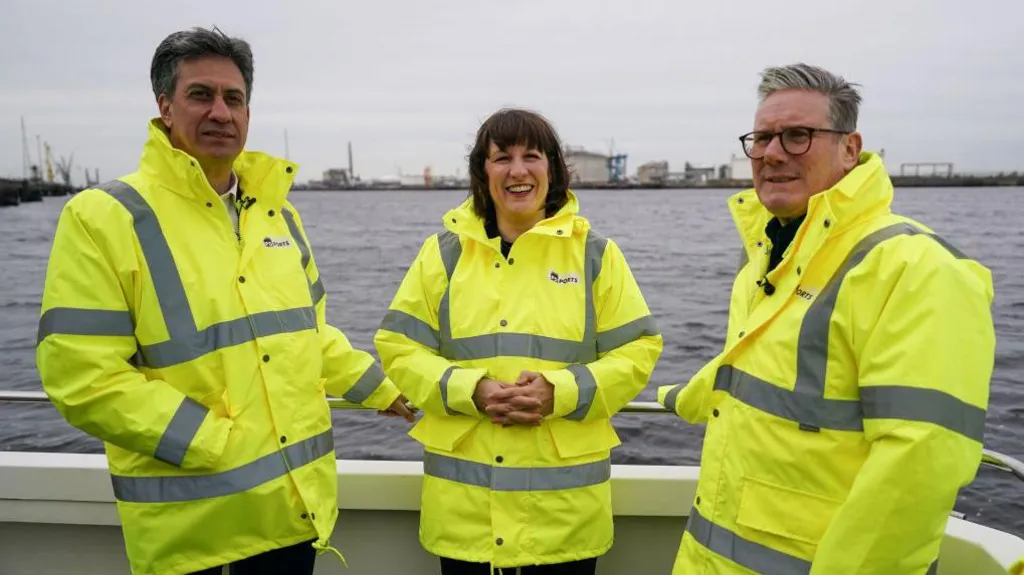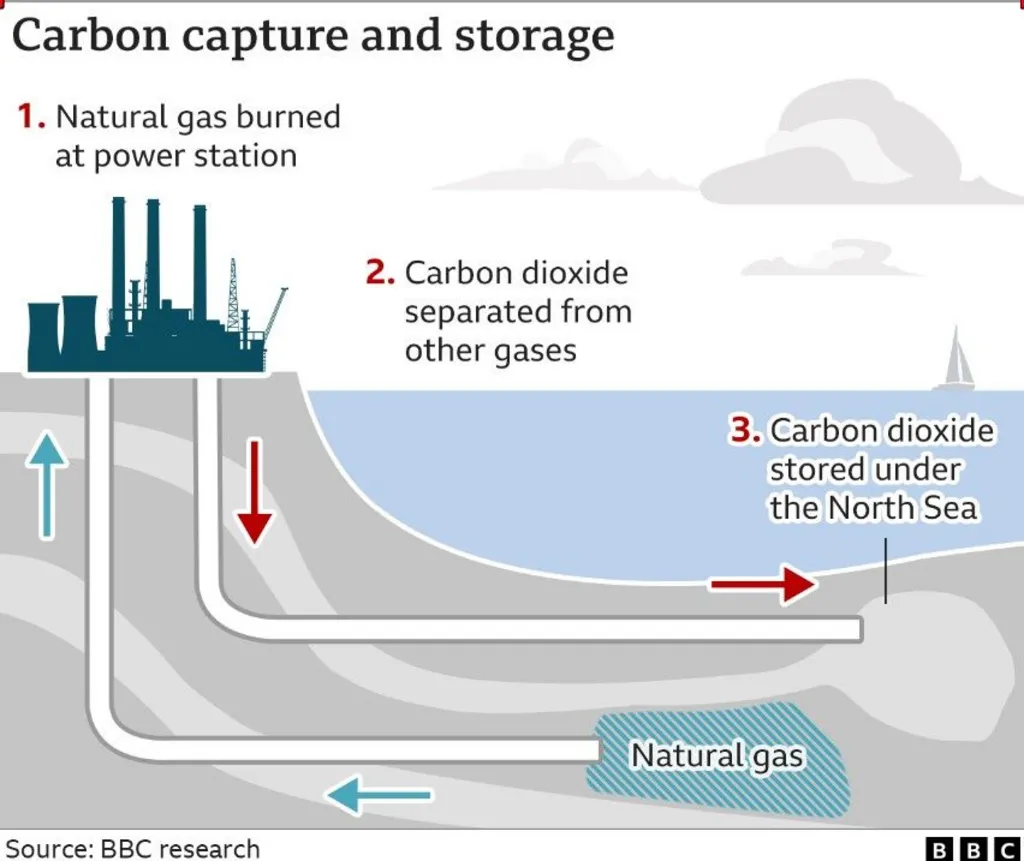
Nearly £22bn Pledged for Carbon Capture Projects
Published by Todd Bush on October 4, 2024
The government has pledged nearly £22bn for projects to capture and store carbon emissions from energy, industry, and hydrogen production. This significant investment will drive forward carbon capture and storage technologies, crucial for reducing emissions across the UK.
The funding for two "carbon capture clusters" on Merseyside and Teesside, promised over the next 25 years, is expected to create thousands of jobs, attract private investment, and help the UK meet its climate goals.

Ed Miliband, Rachel Reeves and Keir Starmer visit Teesside earlier this year, where one of the promised clusters will be stationed.
>> In Other News: 1PointFive Sequestration Hubs Awarded Department of Energy Funding
Sir Keir Starmer, who is visiting the northwest of England with Chancellor Rachel Reeves and Energy Secretary Ed Miliband to confirm the projects, said the move would "reignite our industrial heartlands" and "kickstart growth." Starmer emphasized the importance of these projects for ensuring the UK's economic future while tackling climate change.
However, some green campaigners have expressed concerns, stating that the investment could "extend the life of planet-heating oil and gas production." Critics argue that the focus should be on renewable energy and energy efficiency instead of prolonging the use of fossil fuels.
Game-changing
Carbon capture and storage facilities aim to prevent carbon dioxide (CO2) produced by industrial processes and power stations from being released into the atmosphere. Most of the CO2 is captured, transported, and stored deep underground, helping to mitigate its environmental impact. This technology is seen by organizations like the International Energy Agency (IEA) and the Climate Change Committee as a critical tool in reducing greenhouse gas emissions.
Despite Miliband first announcing plans to develop carbon capture projects for power plants in 2009 during the last Labour government, little progress has been made in the UK since then. Speaking at a glassmaking factory in Cheshire, Sir Keir said, "For our energy-intensive industries like glassmaking, cement, steel, or ceramics, the future belongs to them, and decarbonisation does not mean de-industrialisation."

Speaking to the Today programme, Miliband said the project was "essential if we are to decarbonise without de-industrialising." He added that the government is investing in the future of Britain to create the next generation of good jobs and ensure energy security.
Miliband also paid tribute to the end of coal-fired energy production in the UK, remarking that "if Monday was the end of an era, today marks the beginning of a new era with carbon capture and storage."
The government plans to subsidize three projects on Teesside and Merseyside with up to £21.7bn, supporting the development of the clusters and the infrastructure to transport and store carbon. This investment will also support two transport and storage networks that will carry captured carbon to deep geological storage sites in Liverpool Bay and the North Sea.
The government stated that this move would boost industry confidence to invest in the UK, attracting £8bn of private investment and directly creating 4,000 jobs while supporting 50,000 in the long term. Additionally, the projects are expected to remove 8.5 million tonnes of carbon emissions each year.
The projects aim to begin storing captured carbon by 2028. This timeline demonstrates the urgent need to reduce emissions and accelerate the transition to a low-carbon economy.
Last year, the Conservative government announced a £20bn plan for carbon capture, but Labour argued that it had not committed any actual funding. In her strongest indication yet of a significant increase in state investment, Reeves explained that contracts like these were never signed by the previous government because of its lack of prioritization for capital investment.
Reeves emphasized that "this game-changing technology will bring 4,000 good jobs and billions of private investment into communities across Merseyside and Teesside, igniting growth in these industrial heartlands."
Emma Pinchbeck, chief executive of Energy UK, described carbon capture, utilization, and storage as "a tool in our armoury of technologies needed to decarbonise parts of energy we currently can't do with clean electricity." This technology offers a unique solution to addressing emissions from sectors that are otherwise hard to decarbonize.
James Richardson, acting chief executive of the Climate Change Committee, remarked that "it's fantastic to see funding coming through for these big projects." He underscored the importance of government support in driving the transition to cleaner energy sources.
However, Doug Parr, policy director of Greenpeace UK, urged the government to focus on renewable energy sources like offshore wind and nationwide home insulation. He questioned the long-term viability of investing such large sums into carbon capture, particularly if it extends the life of fossil fuels.
Meanwhile, Friends of the Earth expressed concerns that the government should spend more on insulating homes rather than investing in carbon capture technology, which they argue will only extend the lifespan of the fossil fuel industry. They advocate for a stronger focus on renewable energy solutions instead of prolonging reliance on fossil fuels.
But Miliband questioned what the alternative to carbon capture is. He said, "Just take net-zero Teesside, which provides us with a gas-fired power station but captures the carbon. Now, what's the alternative to that? That provides low-carbon, flexible power generation when the wind doesn't blow or the sun doesn't shine—without it, we’re left with unabated gas."
He added that the UK needs "all the technologies at our disposal" as the backbone of the energy system will increasingly rely on renewables. The shift towards renewable energy and the deployment of complementary technologies like carbon capture are essential for achieving net-zero.
The Merseyside and Teesside projects are among several announced in 2023 aimed at capturing and storing between 20-30 million tonnes of CO2 annually by 2030. These initiatives highlight the UK's commitment to tackling climate change and reducing its carbon footprint.
Subscribe to the newsletter
Daily decarbonization data and news delivered to your inbox
Follow the money flow of climate, technology, and energy investments to uncover new opportunities and jobs.
Latest issues
-
Inside America’s Carbon Capture Reality Check
Inside This Issue ⚡ Duke Energy Florida Goes Live With First 100% Hydrogen System ✈️ Air bp Signs Agreement With Airbus on Flight Services and Fuel Supplies in Europe 🌊 Pairing Reefs and Mangroves...
-
Three Nebraska Plants Prove Ethanol CCS Actually Works
Inside this Issue 🌽 Three Nebraska Plants Prove Ethanol CCS Actually Works ☀️ SunHydrogen and CTF Solar Sign Agreement to Accelerate Hydrogen Panel Manufacturing 🧪 GenH2 Completes Major Milestone:...
-
DOE Doubles Down on $1/kg Clean Hydrogen Goal
Inside This Issue 🎯 Doe Doubles Down on $1/kg Clean Hydrogen Goal 🕳️ Quebec Introduces First Legal Framework for Underground CO2 Storage 🧪 Charbone Announces Its First Hydrogen Supply Hub in the O...
Company Announcements
-
JERA Announces Close of Haynesville Shale Gas Asset in Louisiana
TOKYO and HOUSTON, Feb. 12, 2026 /PRNewswire/ -- JERA Co. Inc., a global energy leader and Japan's largest power generation company, today announced that through its subsidiary JERA Americas Inc., ...
-
Buffalo Biodiesel Inc. (“BBD”), a leading recycler of waste vegetable used cooking oil (WVUCO) and producer of renewable feedstocks, announced that they have officially renewed a Part 364 Waste Tra...
-
Air bp Signs Agreement With Airbus on Flight Services and Fuel Supplies in Europe
Air bp has signed a multi-year contract with Airbus for the supply of conventional aviation fuel, sustainable aviation fuel (SAF), and related services in Germany and Spain. This agreement enables ...
-
BEND, Ore.--Element 1® Corp. (“e1”), an Oregon-based leader in methanol-to-hydrogen generation technology, today announced the signing of a Memorandum of Understanding (MOU) with Aurosi Precision C...